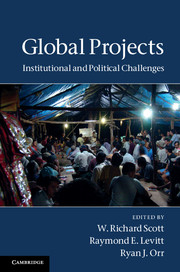Book contents
- Frontmatter
- Contents
- List of figures
- List of tables
- List of contributors
- Preface
- Introduction: studying global projects
- Part I Foundational themes
- Part II Institutional differences and global projects: empirical studies
- Part III Political conflicts and global projects
- 8 “Site fights”: explaining opposition to pipeline projects in the developing world
- 9 To talk or to fight? Effects of strategic, cultural, and institutional factors on renegotiation approaches in public–private concessions
- Part IV Governance strategies and structures
- References
- Index
8 - “Site fights”: explaining opposition to pipeline projects in the developing world
Published online by Cambridge University Press: 05 June 2012
- Frontmatter
- Contents
- List of figures
- List of tables
- List of contributors
- Preface
- Introduction: studying global projects
- Part I Foundational themes
- Part II Institutional differences and global projects: empirical studies
- Part III Political conflicts and global projects
- 8 “Site fights”: explaining opposition to pipeline projects in the developing world
- 9 To talk or to fight? Effects of strategic, cultural, and institutional factors on renegotiation approaches in public–private concessions
- Part IV Governance strategies and structures
- References
- Index
Summary
The study of social movements has grown remarkably over the past three decades. From its modest beginnings in sociology in the 1970s, the field has expanded dramatically and become far more interdisciplinary in its focus (see Chapter 3). Yet for all the proliferation of research and new-found intellectual breadth, the field still bears much of the imprint of the period in which it emerged. The field developed apace of the New Left protest cycle of the 1960s and 1970s and in many respects remains oriented toward a 1960s image of contention and, as a number of commentators have noted, biased toward the study of Western-style reform movements (Almeida 2003; Boudreau 1996; Brockett 2005; McAdam, McCarthy, and Zald 1996; Wickham 2002).
This bias persists in the face of two broad trends that appear to be shifting the geographic locus of 1960s-style protest activity away from the democratic West. Starting with Meyer's and Tarrow's (1997) volume entitled, The Social Movement Society, the weight of speculative evidence continues to suggest that the social movement “form” has been largely institutionalized across the democratic West (McAdam et al. 2005). Institutionalization has meant an increase in formal social movement organizations (Minkoff 1993, 1995), the development of “hybrid” forms of movement activity (Sampson et al. 2005), and a sharp decline in the kind of disruptive, public protest associated with the 1960s and 1970s (McAdam et al. 2005).
- Type
- Chapter
- Information
- Global ProjectsInstitutional and Political Challenges, pp. 279 - 309Publisher: Cambridge University PressPrint publication year: 2011
- 2
- Cited by

